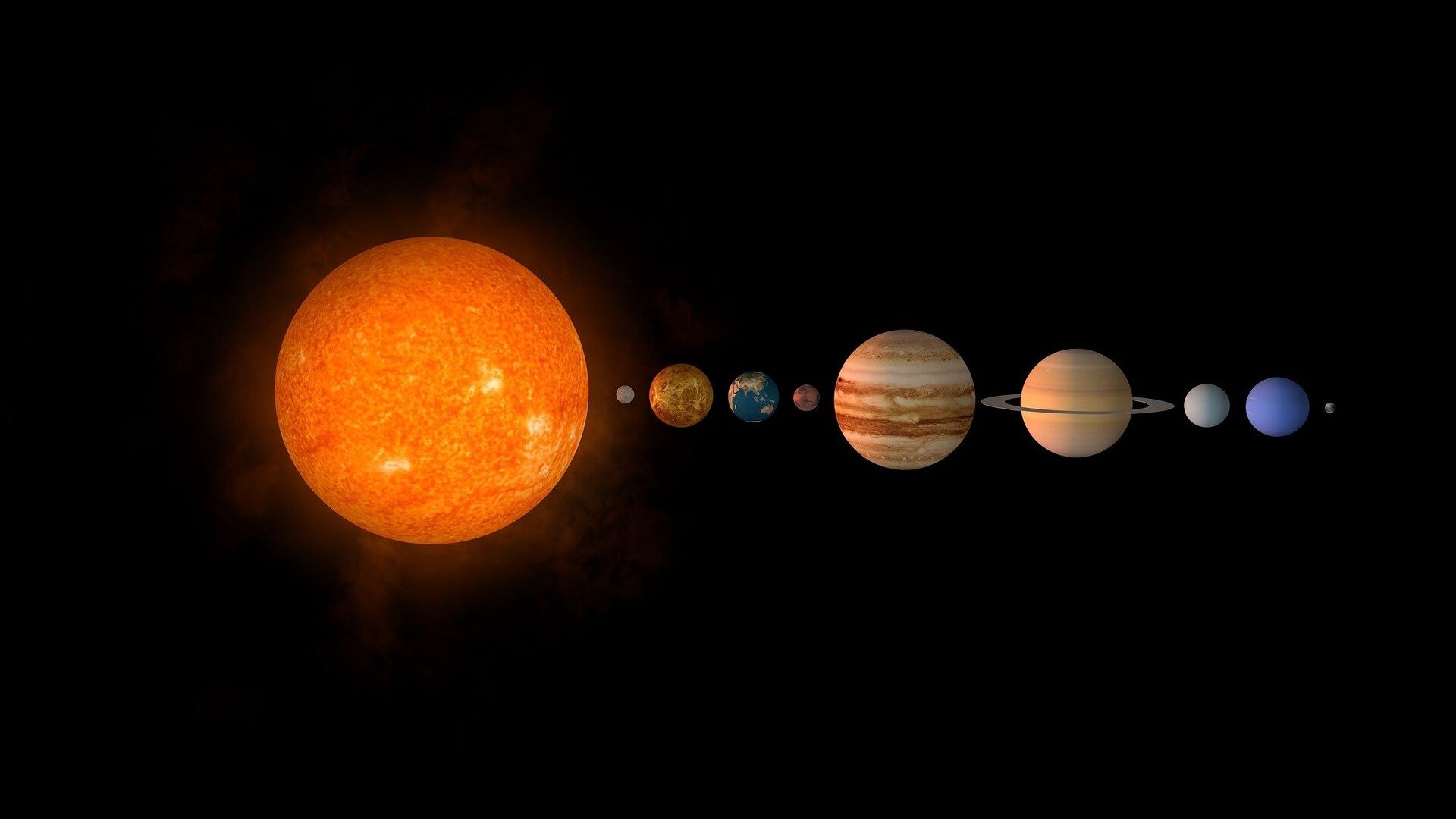https://sputnikglobe.com/20220807/the-earth-is-moving-away-from-the-sun-but-do-not-be-alarmed-1099365522.html
The Earth is Moving Away From the Sun, But Do Not Be Alarmed
The Earth is Moving Away From the Sun, But Do Not Be Alarmed
Sputnik International
The average distance from the Sun to the Earth is approximately 94.26 million miles, but that is increasing. 07.08.2022, Sputnik International
2022-08-07T23:58+0000
2022-08-07T23:58+0000
2023-04-21T10:42+0000
sun
earth
science & tech
https://cdn1.img.sputnikglobe.com/img/105235/51/1052355161_0:60:1920:1140_1920x0_80_0_0_99bfe97f11232a1f71acfc4f553a6460.jpg
The Earth is moving away from the Sun, but don’t expect any cooler temperatures because of it. According to Livescience, the Earth’s average distance from the Sun is increasing, but at a very slow rate of about 2.36 inches a year. That pales in comparison to the variations in the distance between the Earth and the Sun that happens annually because of the planet’s elliptical orbit.At different times of the year, the Earth can be as little as 91.4 million miles away from the Sun and as much as 94.5 million miles. That 3.1 million mile fluctuation dwarfs any increase that comes from Earth’s growing orbit.The reason why the Earth is moving away from the largest body in our solar system shows that the solar system is aging. The primary driver behind the movement is the Sun's continuous loss of mass. The Sun runs off of nuclear fusion, which converts its mass into energy that powers life on Earth. Thanks to Einstein, we know that matter and energy cannot be destroyed or created, only converted, which means the Sun’s mass is continually depleting. It will eventually lose 0.1% of its mass before it begins its death cycle billions of years into the future.While 0.1% sounds like an insignificant number, given the massive size of the Sun, it isn’t. It is equivalent to the entire mass of Jupiter, the largest planet in our solar system, and roughly 318 times the entire mass of Earth. Gravity is determined by the mass of an object so less mass means the Sun’s pull on the Earth is getting slightly weaker over time.There is another factor, the Earth itself. Just like the gravity from the moon causes the tides of the oceans to rise and fall, Earth’s gravity affects the Sun as well. Its pull causes mass from the Sun to bulge out slightly towards the planet, helping move the Earth along its orbit and further away from the Sun. That movement is even more insignificant than the movement from the loss of the Sun’s mass, it is causing the Earth to move 0.0001 inches away from the Sun annually.All things being equal, this movement would help lower temperatures slightly after a billion years, with about 0.4% less of the Sun’s energy hitting the Earth after that time. But that will be far less than normal variations in the Sun’s brightness and will be more than offset by the phases in the Sun’s life cycle. Every billion years the Sun is expected to get 6% brighter for the next 5 billion years. After that time, it will run low on hydrogen fuel and begin to bloat into a red giant star.By that time, the Sun will have already boiled away Earth’s oceans and rendered the planet inhabitable. Most models predict that once the Sun becomes a red giant it will engulf the planet. A few models suggest the planet may survive just outside of the Sun’s reach, but it will be a boiling mass of molten hot lava.If humans are around at that point, they will have to have mastered planet-moving technologies, if they want to keep the Earth around.
https://sputnikglobe.com/20220803/earth-beats-own-rotation-record-by-ending-a-day-159ms-faster-1098077596.html
earth
Sputnik International
feedback@sputniknews.com
+74956456601
MIA „Rosiya Segodnya“
2022
News
en_EN
Sputnik International
feedback@sputniknews.com
+74956456601
MIA „Rosiya Segodnya“
Sputnik International
feedback@sputniknews.com
+74956456601
MIA „Rosiya Segodnya“
sun, earth, science & tech
sun, earth, science & tech
The Earth is Moving Away From the Sun, But Do Not Be Alarmed
23:58 GMT 07.08.2022 (Updated: 10:42 GMT 21.04.2023) The average distance from the Sun to the Earth is approximately 94.26 million miles, but that is increasing.
The Earth is moving away from the Sun, but don’t expect any cooler temperatures because of it. According to Livescience, the Earth’s average distance from the Sun
is increasing, but at a very slow rate of about 2.36 inches a year. That pales in comparison to the variations in the distance between the Earth and the Sun that happens annually because of the planet’s elliptical orbit.
At different times of the year, the Earth can be as little as 91.4 million miles away from the Sun and as much as 94.5 million miles. That 3.1 million mile fluctuation dwarfs any increase that comes from Earth’s growing orbit.
The reason why the Earth is moving away from the largest body in our solar system shows that the solar system is aging. The primary driver behind the movement is the Sun's continuous loss of mass. The Sun runs off of nuclear fusion, which converts its mass into energy that powers life on Earth. Thanks to Einstein, we know that matter and energy cannot be destroyed or created, only converted, which means the Sun’s mass is continually depleting. It will eventually lose 0.1% of its mass before it begins its death cycle billions of years into the future.
While 0.1% sounds like an insignificant number, given the massive size of the Sun, it isn’t. It is equivalent to the entire mass of Jupiter, the largest planet in our solar system, and roughly 318 times the entire mass of Earth. Gravity is determined by the mass of an object so less mass means the Sun’s pull on the Earth is getting slightly weaker over time.
There is another factor, the Earth itself. Just like the gravity from the moon causes the tides of the oceans to rise and fall, Earth’s gravity affects the Sun as well. Its pull causes mass from the Sun to bulge out slightly towards the planet, helping move the Earth along its orbit and further away from the Sun. That movement is even more insignificant than the movement from the loss of the Sun’s mass, it is causing the Earth to move 0.0001 inches away from the Sun annually.
All things being equal, this movement would help lower temperatures slightly after a billion years, with about 0.4% less of the Sun’s energy hitting the Earth after that time. But that will be far less than normal variations in the Sun’s brightness and will be more than offset by the phases in the Sun’s life cycle. Every billion years the Sun is expected to get 6% brighter for the next 5 billion years. After that time, it will run low on hydrogen fuel and begin to bloat into a red giant star.
By that time, the Sun will have already boiled away Earth’s oceans and rendered the planet inhabitable. Most models predict that once the Sun becomes a red giant it will engulf the planet. A few models suggest the planet may survive just outside of the Sun’s reach, but it will be a boiling mass of molten hot lava.
If humans are around at that point, they will have to have mastered
planet-moving technologies, if they want to keep the Earth around.




